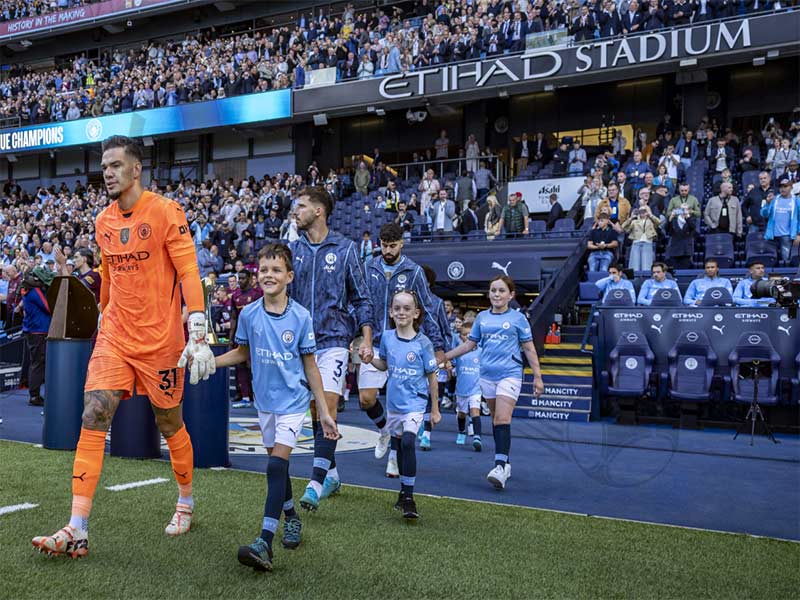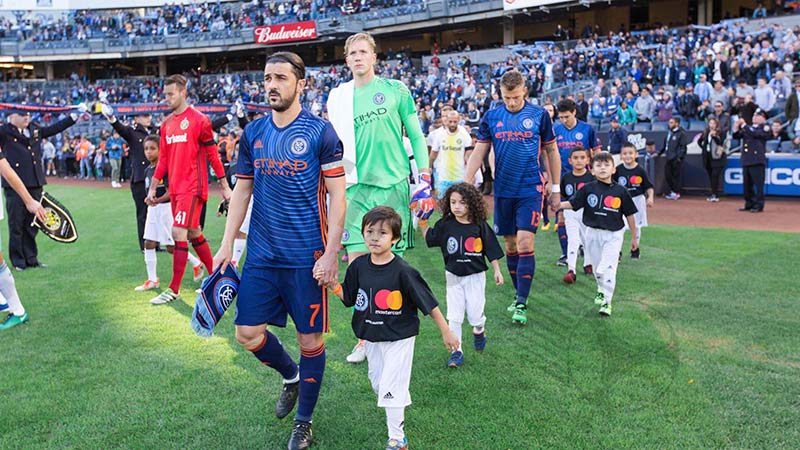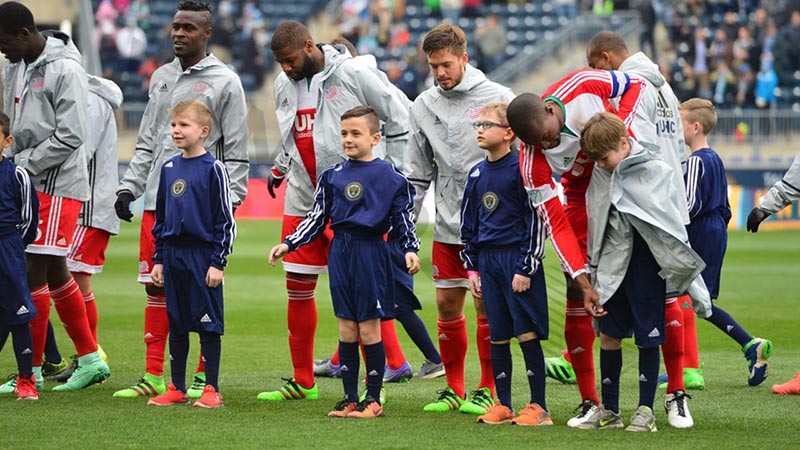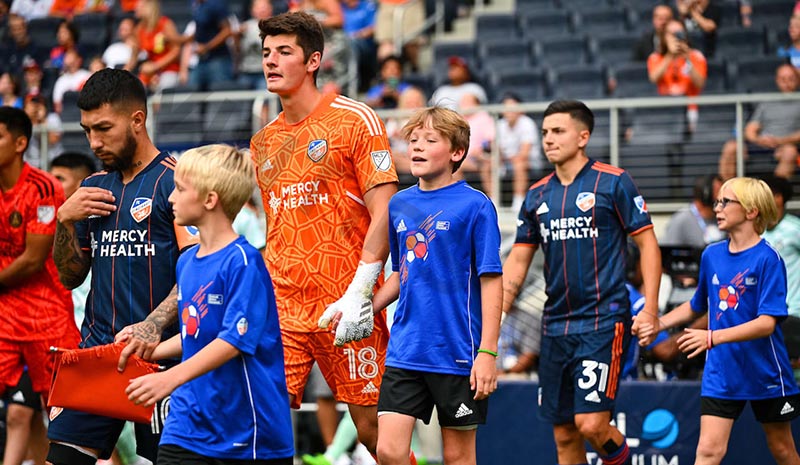Why do soccer players walk out with kids? There are many meaningful reasons for this. First of all, it is a way for them to become more aware of their great responsibility as role models admired by children. In addition, it also serves to support positive campaigns and messages for children, demonstrate the pure spirit that soccer should convey, and help realize the dreams of children. Let's explore the details with Wintips in the following article!

Why do children accompany football players?
An overview
Unlike many other football traditions, the practice of players accompanying children has been around since the 1990s, although the exact date of its first appearance is unknown.
Some football historians believe that the tradition was quickly adopted because it reflects the intergenerational nature of the game and serves as a reminder of players' important responsibilities to the younger generation.
Others believe that the practice may have originated from teams gradually incorporating children into their programs to act as mascots or player escorts.
Typically, each player is accompanied by a child, or the team may have a mascot. However, the approach of having each player accompany a child has become more common, especially with many European clubs having official mascots.
Some famous football mascots include Manchester United's Fred the Red, Arsenal's Gunnersaurus Rex, Newcastle United's Monty the Magpie, Bayern Munich's Berni, AC Milan's Milanello, and FC Barcelona's L'avi del Barça (formerly Clam).
Growing into the norm
Two major football tournaments are considered to have contributed to popularizing the tradition of players accompanying children, almost becoming an unspoken convention: UEFA Euro 2000 and the 2002 World Cup.
In the run-up to Euro 2000, players would walk onto the pitch with their arms linked as a symbol of team spirit. This ritual would continue until the national anthems were played, just before the match began.

The 2002 World Cup elevated the practice to a level far beyond that of Euro 2000. In addition, this period saw many organizations step up their campaigns to protect children’s rights, including UNICEF, one of the main partners of the tournament. This helped the tradition gain wider public attention and support.
How do children get selected to play with a soccer player?
Many parents and children often wonder how to become a player escort or mascot for a match. Typically, the basic criteria require children to be between the age of 5 and 17.
This requirement is based on practical reasons: children under 5 can be overwhelmed when stepping out in front of thousands of spectators in a stadium, while children over 17 are considered adults.
Other options for becoming a player escort or child mascot include:
1. Rewarding Loyal Fans
Many professional football clubs maintain their loyal supporters through loyalty programs, which reward them for their significant contributions to the team. These programs often provide special opportunities for fans, especially children, to participate in memorable events such as becoming a player chaperone.
Loyal fans are often recognized based on criteria such as season ticket ownership or maintaining regular attendance at matches. Clubs also extend these opportunities to the children of loyal supporters as a way of continuing the tradition of engagement.
For example, the English Premier League (EPL) recently launched a #MyPLWish contest, offering exciting (yet undisclosed) prizes to fans in the United States, Puerto Rico, Guam, the U.S. Virgin Islands, and American Samoa, showing appreciation for its international fan community.
2. Make dreams come true
Many football clubs are known for helping young fans facing serious or terminal illnesses by offering them special opportunities to become player chaperones or team mascots. A touching example is Bradley Lowery, who was the mascot for Sunderland before his death from neuroblastoma in 2017.

In addition, non-profit organizations such as the Make-A-Wish Foundation play a key role in making dreams come true for seriously ill children, helping them meet their favorite team or travel with them.
These experiences go beyond simply stepping onto the pitch with players before a match and can include a range of other special club-related activities. However, all participation requires consent from the child, parent, physician, and caregiver to ensure safety and appropriateness for the child's health condition.
3. Youth Development System
Most of the world’s top football clubs, especially in Europe, have youth development systems aimed at nurturing the next generation of players. Famous academies such as Barcelona’s La Masia, Chelsea Academy, Arsenal Academy, and Manchester United Academy are prime examples.
These academies focus not only on football skills but also provide opportunities for young talents to get closer to the club’s first team. This allows them to interact with and learn from top stars, seek valuable advice, and experience the atmosphere of a top match. These elements cannot be fully conveyed in books or regular training sessions.
4. Paid Opportunities
Some football clubs offer parents the opportunity to have their children escort players onto the pitch for a fee. While not as iconic as other methods, this practice is still seen as an effective way to raise funds for the club and its charitable causes.

In the Premier League (EPL), some clubs charge a fixed fee for children to become chaperones or mascots. This can range from around £86 to over £1,200, depending on the popularity and status of the team.
These opportunities are often offered on a first-come, first-served basis, ensuring that all children will have the chance to participate at some point during the season, creating a memorable experience for them and their families.
Conclusion
The image of football players playing with children is not only symbolic but also contains profound human values. This is a reminder for players to set an example and a way for clubs to affirm their social responsibility, from supporting campaigns for children and realizing dreams to developing young talents. Moreover, through volunteer programs, paid fees, or community initiatives, this tradition has created a bridge connecting the young generation and football. Since important milestones such as Euro 2000 and the 2002 World Cup, player escorting has become an indispensable part of matches, inspiring and nurturing the love of sports in future generations.
See more: How many trophies does Ronaldo have? A career overview







